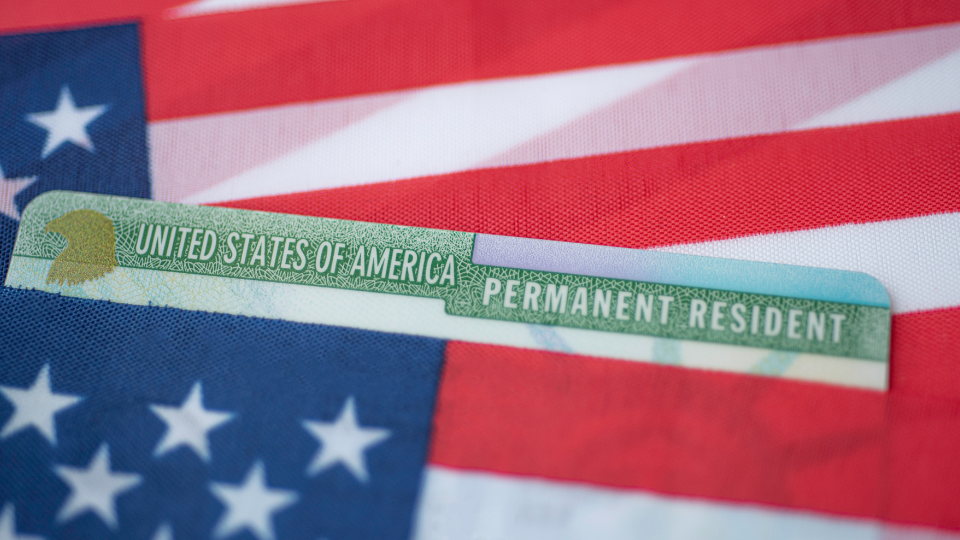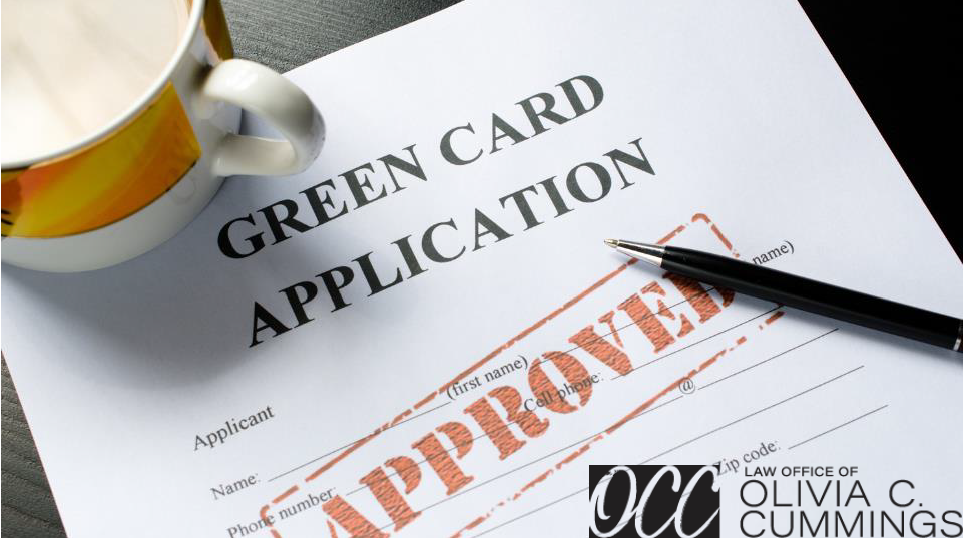The marriage-based adjustment of status interview is often considered one of the most crucial steps throughout the marriage-based green card process. Although the interview is conducted several months after submitting the initial application, its core significance and weightage throughout the process cannot be denied.
The primary purpose of the marriage-based adjustment of status interview, which is conducted in the United States by the U.S. Citizenship and Immigration Services (USCIS), is to ensure that the marriage between the immigrant spouse and their petitioner is bona fide and has not been done to evade U.S. immigration laws and avail of its benefits.
How does the process begin? Which steps are involved in the interview process, and the essential guidelines must you adhere to? All of these points are elaborated on in further detail below.
- Marriage-Based Green Card
The United States has provided a provision within the Immigration and Nationality Act (INA) to immediate relatives of U.S. citizens, in that they can become Green Card holders (also known as Lawful Permanent Residents) if a U.S. citizen invites them to the country via a Form I-130 petition.
For immigrant spouses who are classified as immediate relatives, a marriage-based Green Card permits them to legally live and work anywhere in the United States for the duration of their status.
A person with a Green Card can live in the country permanently, so long as their Green Card status remains valid and has not been revoked. Additionally, once eligible, the Immigrant Spouse may also seek Naturalization after a specified time—typically within 3 or 5 years.
- Interview Process
The USCIS examines applications of almost all immigrant spouses for a marriage-based Green Card. The immigrant spouse usually gains permanent residency after a successful marriage-based adjustment of status interview.
Each married couple should thoroughly prepare well in advance for their upcoming marriage-based adjustment of status interview. Your chances of receiving rapid approval will likely increase if you know what to anticipate, what to bring, and how to respond to inquiries.
However, following all the legal guidelines and even having experienced counsel to assist you throughout the process increases the chances of excelling in your interview.
Following are a few important steps involved in the marriage-based adjustment of status interview:
- Reviewing applications and supporting documents
We suggest that applicants submit all required documents when filing their applications. It is important to note that even minor mistakes within the application or failure to submit all supporting documents can result in application denials or delays in processing.
Once you have presented all documents to the USCIS, it is always recommended to keep copies of submitted evidence for your records. Furthermore, should carefully and thoroughly review the evidence submitted, as you may be questioned about the information provided. For example, you may be asked about your wedding date, employment history, residence history, etc.
Addedly, the information must be consistent throughout the forms. This is very important, as any misstatements or irregularities in information may potentially bring adverse outcomes.
If the USCIS determines that they require additional information to process your application, you may receive a Request for Additional or Initial Evidence (RFE) by mail and/or through your online USCIS account.
- Interview Appointment Notice
Once the application package for a marriage-based Green Card has been filed, you will typically be scheduled for two major appointments by the USCIS:
The USCIS may schedule the following appointments:
- Biometrics Appointment
- Interview Appointment
All applicants are informed about their biometrics and interview dates by the USCIS. Generally, the USCIS will send appointment notices to applicants on a form or letter labeled as I-797C Notice of Action, by mail and/or through your online USCIS account.
Typically, the time frame for the USCIS to process these applications and schedule applicants for their marriage-based adjustment of status interview is roughly 12 to 24 months. Even though you sent your application to a USCIS lockbox location, an interview will be scheduled at the nearest or local USCIS field office.
- Interview Questions
The marriage-based adjustment of status interview is undoubtedly one of the most critical portions of the whole Green Card process and holds immense importance. In the interview, the Immigration Officer may ask a variety of questions about the nature and validity of the couple’s relationship.
The interview allows the Immigration Officer to verify that the couple has entered their marriage solely due to a genuine relationship, that their marriage is bona fide, and that the immigrant spouse has not entered the marriage to avail gains of the Green Card or to obtain other immigration benefits.
The Immigration Officer may start the interview by making small talk. Keep in mind that your responses are highly pertinent to the interview and that the Immigration Officers are trained to present that questions in a fashion to screen all applicants for potential red flags. At times, the Immigration Officer’s inquiries may become a little personal.
More specifically, to further investigate the case and verify the relationship, the immigration officer may ask questions about:
- Relationship History
- Wedding Details
- Children (If any)
- Personal Habits
- Events Celebrations
- Daily Routines
- Employment History
- Friends and Family
- Education
- Past Marital History
- Prior Immigration Applications/Petitions
You may also be questioned about categories not mentioned above, as the Immigration Officer sees fit to adjudicate your application.
- Documents needed for the interview
While all applicants are informed of the required documents that must be presented at the time of their marriage-based adjustment of status interview, it may be helpful to also consider bringing the following essential documents:
- Appointment Notice (I-797C, Notice of Action)
- Passport or Government Issued ID
- Birth Certificates
- Marriage Certificates and Divorce Decrees (if applicable)
- Medical Examination Report on Form I-693 (if not submitted prior)
- Updated Financials (i.e., employment verification letter, recent pay slips, joint tax returns, etc.)
- Children’s Birth Certificates (if applicable)
- Originals of any documents submitted with your initial application
Furthermore, you should prepare to bring additional documents to demonstrate your shared existence with your spouse, such as a combined mortgage or lease, joint credit card or bank statements, joint medical insurance, notarized and signed affidavits from family and friends, etc.
- Interview Guidelines
If your marriage is valid and has not been entered into for the purpose of evading immigration laws, and is genuinely bona fide, then you may have an easier time answering questions and submitting sufficient documentation. However, these suggestions may increase your chances of acing your interview:
- Remain Honest
While the immigration officer is questioning your past or current personal life, you should always remain honest, open, and transparent. If there are any contradictions between the information provided in your application package and what you say as testimony during the interview, it may negatively affect the outcome of your application.
Think of the interview as a chance to provide the Immigration Officer with a glimpse into your married life rather than as a requirement to portray the perfect marriage.
- Speak Freely
Some Immigration Officers will probe deeply into personal matters. You have every right to inform the Immigration Officer if a question is insulting or uncomfortable to you, and you may choose not to respond and simply ask the Immigration Officer to ask you another question in a different form. Most Immigration Officers will comprehend and move on to the next query. However, it is very important that you remain respectful and cooperate with the Immigration Officer in an appropriate manner.
- Be Prepared
Discussing facts about your marital and pre-marital relationship with your immigrant spouse is always recommended. It is crucial to rehearse even basic details of your relationship before your marriage-based adjustment of status interview. Reviewing and rehearsing each item on your submitted application with your spouse is a great place to start.
These interviews can at times be extremely nerve-wracking for most applicants, especially the immigrant spouse, even those who have been married for a long time. However, the more you rehearse and prepare, the less uncomfortable you’ll probably be. Almost usually, it is preferable to be over-prepared in this circumstance.
- After the Interview
If your marriage-based adjustment of status interview goes well, an Immigration Officer will usually finalize and approve your Green Card application package. In that instance, the USCIS will prepare and produce your official Green Card, which will then be mailed to your registered address. If you have moved since filing your initial application, it is important to update your new address with the USCIS promptly.
- Approval and Denial Scenarios
As provided above, if the Immigration Officer determines that your marriage is valid and you have provided satisfactory supporting evidence, they will approve the issuance of a Green Card. However, the Immigration Officer may not inform you of their decision on the spot, so do not be discouraged are alarmed at that time. All applicants will be informed regarding the decision in their case by mail and/or through their online USCIS account.
However, if the Immigration Officer is not satisfied with the interview and finds any misleading or questionable information, they have a right to request additional information and supporting evidence. It is very important to provide the appropriate paperwork by the deadline if USCIS asks for more explanation. If you are unsure of how to respond to the USCIS’s request for more information, it is advisable that you retain the services of an experienced Immigration Attorney to assist you with this process.
Addedly, in some cases, if fraud is suspected, they may even schedule the applicants for a second interview (commonly known as a Stokes interview). A Stokes interview is often much more grueling and is typically conducted by a more experienced Immigration Officer.
In either event, you should contact the USCIS after 90 days if you haven’t received further correspondence regarding your marriage-based adjustment of status interview.
- Conditional Residence
Lastly, if your marriage was less than two (2) years old at the time you filed your concurrent marriage-based adjustment of status application package, the USCIS will issue you a two-year conditional green card upon approval of your application.
In the 90 days before the expiration of your two (2) year conditional green card, the immigrant spouse and the petitioning spouse must file a joint petition to have the conditions removed. To do so, the immigrant spouse must submit Form I-751, Petition to Remove Conditions, additional documentation of their bona fide marriage, the requisite filing fee, and establish that they meet all requirements of the application.
- Our Consultation
The marriage-based green card process seems relatively easy, but in some cases, a marriage-based green card application may become complex—criminal history, status violations, and even minor application mistakes or lack of supporting documents can result in a delay or denial of your application.
While it is not mandatory, it is always highly recommended to hire a knowledgeable Immigration Attorney to assist you with the preparation of your immigration application(s) and to accompany you during your marriage-based green card interview.
A reputable Immigration Law Firm, such as the Law Office of Olivia C Cummings, will have an experienced attorney review your entire case to determine what process is best for you moving forward. A case review by an Immigration Attorney will help to weed out any possible issues that may arise in an attempt to eliminate the possibility of an application denial, or worse, an immigrant spouse being placed into deportation and removal proceedings.
If you require assistance with scheduling a consultation, you may contact our office today via phone at (772)236-0148 or via email at office@cummingslawpractice.com.
You can also visit our website at www.cummingslawpractice.com.
Attention: This article was written to provide general information, which should not be construed as legal advice. If you are seeking advice on a specific legal matter, you are encouraged to contact our law firm directly and schedule a consultation with our Immigration Attorney for a thorough review of your case.




